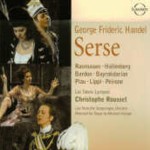The plot of Serse concerns the eponymous Persian monarch, a man of such whimsy in love that he is first heard singing a veritable love song to a plane tree and the shade it offers–the very famous “Ombra mai fu”, sometimes known as Handel’s Largo. Moments later, Serse falls instantly in love with Romilda, who happens to be his brother Arsamene’s beloved. Romilda has a sister, Atalanta, who, upon realizing that her sister loves Arsamene, decides that she will too–she’s a witty troublemaker. (Both girls are daughters of Serse’s general, Ariodate.) Suddenly, into the mix comes Amastre, who has been jilted by Serse; disguised as a man, she has come to either win him back or wreak havoc. A comic character, Elviro, is Arsamene’s servant.
The opera is both funny and serious: In addition to the tangled loves noted above (which cause as much grief as joy), it focuses on Serse’s use and abuse of power, how he treats others, and how seriously he takes himself. In this production from Dresden’s Semperoper, recorded in 2000, director Michael Hampe underscores Serse’s harmful frivolity by having him set fire to, and destroy, his beloved plane tree in a fit of pique in the last act. A Bonsai version of the tree is presented to him in the opera’s last moments and he is therefore given another chance at love.
The sets and costumes by Carlo Tommasi place the action somewhere exotic around the start of the 20th century, with occasionally more modern touches. Not only is this elegant, it suggests the Ottoman Empire and all of its confusions. They’re mostly in blacks, whites, and grays, and the fabulous plane tree, stage center, is encased in steel and glass, recalling I.M. Pei’s pyramid.
The performances are superb. Christophe Rousset’s affinity for Baroque opera is well-known; he treats it as living drama, with recitatives delivered in real time, pauses where they should be, and plenty of room for the singers. Da capo arias are embellished entertainingly and unjarringly, and I doubt many listeners will miss the few cuts he makes in the score. His cast is ideal. The roles of Serse and his brother Arsamene are sung by women (the former was written for castrato), and both Paula Rasmussen and Ann Hallenberg convince as men after the initial few moments. Rasmussen’s voice has the power needed for Serse’s rants as well as the lyricism for “Ombra mai fu”; the voice’s color is a fine amber. Hallenberg’s somewhat darker tone serves well.
The two sisters are Isabel Bayrakdarian as Romilda, whose peppery soprano is distinctive and expressive, and Sandrine Piau as Atalanta, breathtaking throughout with her rapid-fire coloratura and right-on stratospheric additions to the score. Patricia Bardon sings Amastre, and while the role is somewhat underdefined, she makes an impression. Marcello Lippi as Ariodate handles his coloratura well, and Matteo Peirone is a fine Elviro–a role that clearly was meant as a diversion. The only competing version of this opera is from the ENO in an English translation, with Ann Murray in the title role and Charles Mackerras at the helm. This new version is preferred, for performance accuracy and a somewhat less precious attitude. Picture and sound are excellent; subtitles are provided in major European languages. A real joy!
































